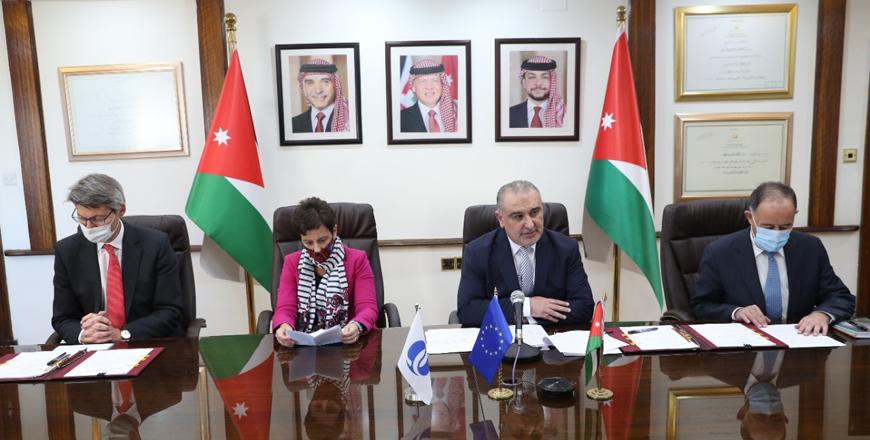You are here
JSC, EBRD sign MoU to support sustainable economic recovery post-pandemic
By Batool Ghaith - Jul 29,2021 - Last updated at Jul 29,2021

The Jordan Securities Commission and the European Bank for Reconstruction and Development are intensifying their capital market development efforts in Jordan (Photo courtesy of EBRD)
AMMAN — The Jordan Securities Commission (JSC) and the European Bank for Reconstruction and Development (EBRD) are intensifying their capital market development efforts in Jordan.
The JSC and the EBRD plan to implement the 2017 government-approved capital market strategy to boost economic growth, according to a statement sent to The Jordan Times.
The two institutions signed a memorandum of understanding (MoU) in Amman on Tuesday, in which they committed to leverage their mutual comparative advantages to support capital market advancement.
Regional Head of the Eastern Mediterranean region Philip ter Woort signed on behalf of the EBRD. “We are pleased to consolidate our partnership with the JSC through this Memorandum of Understanding to work towards further developing Jordan’s capital market,” Woort said.
He indicated that the joint efforts aim to diversify the supply of capital to the Jordanian private sector through a robust and transparent regulatory framework, which will help contribute to Jordan’s sustainable economic recovery post-pandemic, the statement mentioned.
JSC Chairman Leith K. Ajlouni indicated that the MoU continues to achieve the Capital Market Development Project’s goals and actions. “The project’s main activities are guided by the Capital Market Development Strategy and Roadmap for Jordan, funded by the government of Japan, approved by the Cabinet in 2017 with the overriding objective of supporting Jordan’s efforts to boost economic growth,” he said in the statement.
Shimazaki Kaoru, Japan’s ambassador to Jordan, said: “I am glad to witness the signing of the MoU, which I believe gives further momentum to promoting cooperation between the JSC and the EBRD. I hope that this support contributes to Jordan’s better recovery from the COVID-19 pandemic.”
The statement noted that the strategy sets seven strategic goals to increase investor interest: Make the financial market more attractive to issuers, reorient capital market institutions as private-sector operations, make the securities industry more competitive, strengthen the capacity of the JSC, create more attractive investment products and develop outreach programmes for investors and issuers.
Jordan adopted its comprehensive Capital Market Development Strategy and Roadmap for Jordan in 2017, which is funded by the Japanese government. The ultimate goal is to raise Jordan’s profile as a business destination and to attract investments to create new jobs and prosperity for Jordanians. Since the EBRD started investing in Jordan in 2012, the bank has provided more than 1.5 billion euros in financing for 59 projects in the country, according to the statement.
EBRD Capital Market Development Director, Alex Pivovarsky, noted that Jordan is an active country regarding capital market development, as EBRD has had a “very active” programme over the last five to six years.
“We are quite active and we try to give layered support in Jordan to different areas, some related to regulations and others related to efforts in the capital market. As a bank, this is an innovation as we always manage to develop new products for the market as well,” Pivovarsky told The Jordan Times during an interview on Zoom.
According to Pivovarsky, the one-year-long MoU is important because it will reaffirm the commitment to implement the capital market development strategy. He added that the implementation of the MoU will allow the capital market in Jordan “be more vibrant” and foster its future growth.
Pivovarsky noted that the EBRD has been working closely with the JSC on multiple efforts in the capital market development strategy. The joint efforts range from regulatory forms, such as legislations, to reform policies involving capital market and investment funds.
Pivovarsky said that the EBRB will provide regulatory processes and operational guidance to help advance certain implementation steps of the reforms, related to organisational setups and operational models.
According to Pivovarsky, all the reforms will eventually translate into a more efficient market and more accessible opportunities to operate in Jordan, contributing to more investor interest, internally and externally, in operating in the Jordanian market.
The MoU reflects the fact that EBRD has worked closely with the JSC for several years already, Pivovarsky noted. “We think of it [MoU] as an important chapter to get many of the reforms and ideas we have discussed and developed together consolidated and implemented during the one year of the MoU,” he added.
Related Articles
AMMAN — Jordan should implement a set of well-coordinated reforms to fully develop its capital markets, according to a new strategy presente
AMMAN — The Ministry of Planning and International Cooperation and the European Bank for Reconstruction and Development (EBRD) on Sunday sig
AMMAN — The European Bank for Reconstruction and Development (EBRD) and the Jordan Securities Commission on Tuesday presented the Capital Ma














